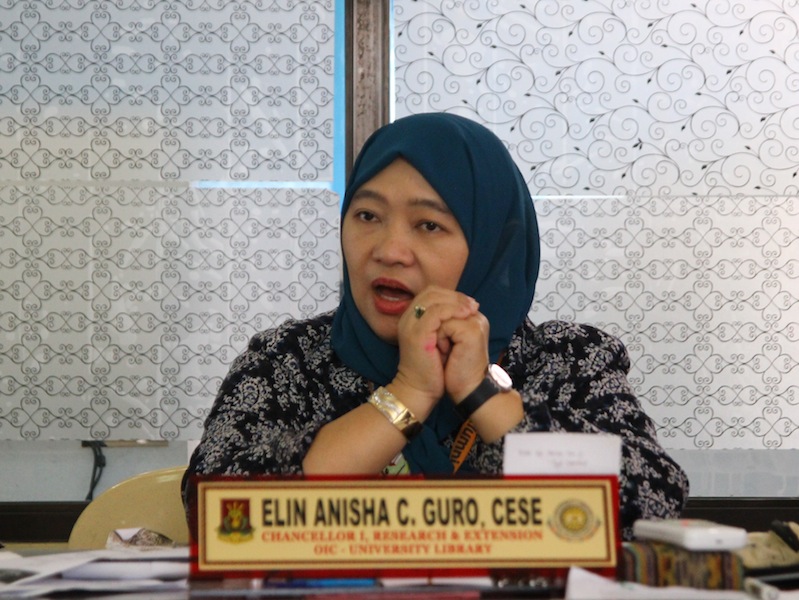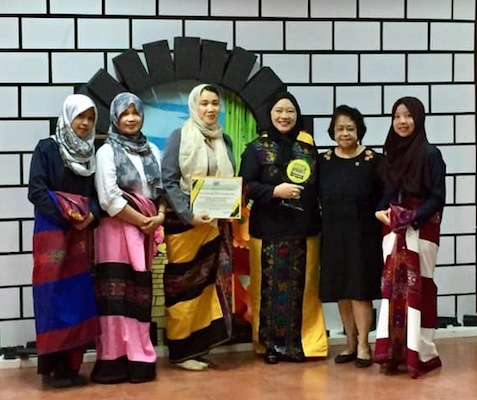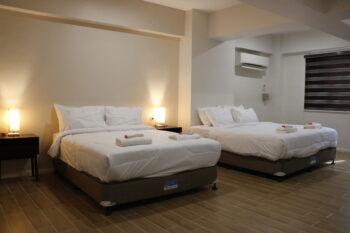MARAWI CITY (MindaNews / 29 May) — When the Marawi Siege happened in 2017, Elin Anisha C. Guro was Director of the Mindanao State University’s Press and Information Office, on study leave to finish her PhD at the School of Culture and Communication, University of Melbourne in Australia. She had earlier finished her MA in Media Studies at the New School in New York City as a Fulbright scholar.
 The once drab and dreary University Library of the Mindanao State University has been transformed into the students’ – and Marawi’s – “happy place.” OIC DIrector Elin Anisha Guro says students now call the library their second home. MindaNews photo by GREGORIO BUENO
The once drab and dreary University Library of the Mindanao State University has been transformed into the students’ – and Marawi’s – “happy place.” OIC DIrector Elin Anisha Guro says students now call the library their second home. MindaNews photo by GREGORIO BUENO
In Melbourne, she watched and monitored the events in Marawi on television and through social media, wrote poems and initiated “Balik MSU: Somombak Tano sa Pantaw a Mareg,” an online campaign for MSU students to return to school.
When she returned to MSU last year, Guro, Chancellor 1 for Research and Extension, was named OIC Director of the University Library.
 Four months after its soft re-launching of “Moving Boundaries: Re-imagining, Re-tooling, and Re-creating the University Library-Mindanao State University,” the University Library was conferred the 2018 Outstanding Library Program Award on 25 January 2019 at the Rizal Library, Ateneo De Manila, Quezon City. Receiving the award on behalf of the University Library are Elin Anisha Guro, OIC Director (third from right) and Soraya Manamparan, Sorayyah Casanguan, Faishanie Macalantong and Ahlam Rohaima Usodan. Photo courtesy of the University Library
Four months after its soft re-launching of “Moving Boundaries: Re-imagining, Re-tooling, and Re-creating the University Library-Mindanao State University,” the University Library was conferred the 2018 Outstanding Library Program Award on 25 January 2019 at the Rizal Library, Ateneo De Manila, Quezon City. Receiving the award on behalf of the University Library are Elin Anisha Guro, OIC Director (third from right) and Soraya Manamparan, Sorayyah Casanguan, Faishanie Macalantong and Ahlam Rohaima Usodan. Photo courtesy of the University Library
Assuming the post on May 21, 2018, she and her team immediately embarked on the journey of transforming a library hardly visited by students into what is now: a “go to” destination (Read: MSu’s University Library: Marawi’s “happy place”) and was even awarded by the Philipppine Association of Academic and Research Librarians, Inc. (PAARL) for its “Outstanding Library Program” for 2018.
Guro spoke with MindaNews’ Carolyn O. Arguillas on the transformation of the once drab and dreary library into what is now the students’ – and Marawi’s “happy place.”
Excerpts:
Q. What motivated you to transform the university library into what it is today?
A. When I was still in Australia, Meranaw female students posted at the group ‘Taga MSU Main Jud Ka Kung’ about looking for any part-time job to help them defray their school expenses. I realized that after the siege, life must be really hard for our students because some are seeking for any kind of job, including domestic chores. During my time as MSU college student, this would never have happened as Meranaw students could always run to their relatives who would also not welcome the idea that their student relatives are working at somebody’s house doing household chores. The girl who posted about looking for work was from Ground Zero and her family had lost everything. While the loss is complete, she wants to finish her studies but at the same time not burden her parents. I know that had the siege not happened, cases like this would have been unthinkable. We Meranaws always look after our own relatives. As an indication, all of us are hosting or helping relatives who have become IDPs even while we are also IDPs ourselves. The student’s post made me fathom the extent and impact of the Siege which has its own cultural implications and adjustments. By a stroke of accident, I became the Officer-in-Charge of the University Library upon my return. It was my chance to make a difference to our Meranaw students who are in that situation. Thus, my colleagues, staff and I worked so hard, including weekends, to transform the Library so that students can find everything they might need inside. If they are looking for inspiration, the beautiful spots inside the library are there to perk up their mood. Should they need to read while sitting on the floor or lying down, the Panggaw a Phaganadan sa Ilmo responds to that need. Our aim is to turn the University Library into their second home.
Q. We visited this library in late August 2017 while the war was still raging at Ground Zero and it was so depressing. I mean, looking at the war zone from the window of the library’s second floor was depressing by itself but finding a library with few books and no students at that time was equally depressing. An empty library is depressing.
A.We want the University Library to attract our students and have a nice ambience for them not only to study and research but to meet up, discuss, debate, sponsor/attend a mini-conference or do group work without having to spend money (which they may not have). Before, students use to hang-out at the Commercial Center for their group activity by paying for space and food. For students who do not have the financial capability, the University Library is the better alternative. By giving the students Free Wi-Fi as well, we are also saving their allowances.
The University Library’s new look manifests our dedication to meet the growing demands of our students as much as we can and show them that learning need not be dreary and boring. New trends in Library as well dictate that we reorganize library spaces to meet learning preference styles and needs. We have incorporated Meranaw art not only to honor the host community of the University, but to promote and preserve these vanishing art and tradition in the light of the destruction of Marawi City. It is also to give a unique identity to the Library at the same time privilege the Meranaws. The cultural symbols inside the library are meant to remind them of their distinctive art and culture make them proud of what they still have in spite of what they have lost.
Q. Initially, you allowed eating inside the library but later stopped it because some students left their trash.
A. We issued a warning that by November 5, no food or any bottled beverage will be allowed inside the Library premises. After all, we have been offering free (hot) water from the first time I became OIC and even free or sponsored coffee at the Coffebookers’ Lounge. Students only need to bring their own mugs or any water container, provided it is not those one-time use water bottles.
Q. How much is coffee at the Coffeebooker’s Lounge?
A. Twenty pesos good for two cups of coffee already. If the sender wants to drink coffee at the Coffeebooker’s Lounge and does not have a mug, he or she will pay the penalty for the cup which is one peso. For the receiver, it is five peso penalty for the cup. This is to ensure that they will bring their own mugs next time and save the environment as well.
Q. What made you decide to transfer (or honor) the Marawi of yore to the library? Yung names niya lahat Ground Zero? Padian, Banggolo..
A. Yes, lahat Ground Zero. The delay of the rehabilitation and the possibility of names of places being changed inspired us to use them to preserve them and to remember them by. If places such as Lilod, Raya, Padian and Banggolo — all part of the Most Affected Area — will be replaced by new names, then the future generation will not know them at all and that means that these places will soon be forgotten. Aside from that, using these names will be a constant reminder to us of what we have lost and what need to be recovered as soon as possible and not be relegated to the background. We Meranaws are forced by circumstances to go on with our lives but we await and anticipate the rehabilitation.
Q. What are your other wishes for the library. Some alumni or institutions may want to help.
A. I want to bring the Library to the communities, particularly those who could not physically visit the Library. I want to have a Mobile Library so we can go to the rural areas and extend our services to them. We intend to network with the different colleges so that when we go there, it is like bringing the University to them. Apart from giving their students a time to read books from our Mobile Library, we will bring experts, for instance on agriculture, forestry, fisheries and women’s health to the rural areas for a sectoral and total service. At the same time, there will be a storytelling for the community’s children and art workshop while their parents attend our lecture-workshops.
By bringing the University Library to them, and presenting them a view of the outside world, we hope to open their eyes to the great possibilities of the outside world.
Q. What about the third floor of the library? That floor still looks depressing.
A. I wish that we will be able to realize our dream of turning our third floor into a Rooftop Garden Cafe or Sapadan Cafe. We will turn that space into a vegetable garden where we will get some of the ingredients for our Cafe’. We aim to only serve organic and locally sourced ingredients to empower our local farmers.
We envision that as an Open Space for students, faculty, staff and researchers to dine, read, write, discuss and debate while overlooking the beautiful Sleeping Lady and the Lake Lanao. It is the venue for our future Meranaw Spoken Word Open Mic, public showings, and seminars on important topics. (Carolyn O. Arguillas / MindaNews)
